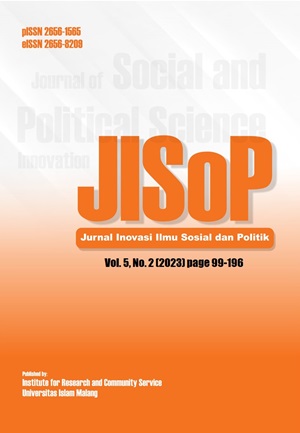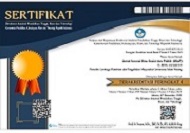Romance in the cloud: Interpersonal communication analysis on relationship stages of online dating
DOI:
https://doi.org/10.33474/jisop.v5i2.20271Keywords:
online dating, relationship development, devito relationship stagesAbstract
Finding love in the digital age can be seen easier than ever. With a simple app, an individual and millions of others can come together and meet from everywhere. The researchers aim to analyze the relationship development in online dating matches through multiple interpersonal communication perspectives. It includes how an individual chooses their potential partner, their initial involvement, self-disclosure, and whether they decide to continue a serious relationship. The research methodology used is qualitative method with in depth interview, using Devito’s Relationship Stages as the theoretical framework. The result shows that compared to traditional dating, online dating couples took extra security precautions in early contact. It is also found that the strength of social bonding, especially with close friends and family members, significantly influences the relationship. There are three main stages of relationships that are experienced in this research; (1) Contact, in line with the Uncertainty Reduction Theory and Communication Privacy Management, (2) Involvement that corresponds with the Social Exchange Theory, and (3) Intimacy, that aligns with Social Penetration Theory.
References
Azzizah, A. N. (2020). Friends with Benefit: Agensi Seksual Kaum Muda dalam Kontestasi Nilai dan Norma. Universitas Indonesia.
Bruch, E. E., & Newman, M. E. J. (2018). Aspirational pursuit of mates in online dating markets. Science Advances, 4(8), 4–10. https://doi.org/10.1126/sciadv.aap9815
DeVito, J. A. (2016). The Interpersonal Communication Book (14th ed.). Pearson Education.
Donn, J. E., & Sherman, R. C. (2004). Attitudes and Practices Regarding the Formation of Romantic Relationships on the Internet. CyberPsychology & Behavior, 5(2). https://doi.org/10.1089/109493102753770499
Ediati, A. (2020). Dampak Positif Teknologi Informasi terhadap Keluarga. In M. Z. Alfaruqy & D. R. Sawitri (Eds.), Dinamika Keluarga & Komunitas dalam Menyambut Society 5.0. (pp. 121–131). Fakultas Psikologi Universitas Diponegoro.
Harrison, D., Rowland, S., Wood, G., Bakewell, L., Petridis, I., Long, K., Vasileiou, K., Barnett, J., Barreto, M., Wilson, M., Lawson, S., & Vines, J. (2023). Designing Technology-Mediated Peer Support for Postgraduate Research Students at Risk of Loneliness and Isolation. ACM Transactions on Computer-Human Interaction, 30(1), 1–40. https://doi.org/10.1145/3534961
Henry-Waring, M., & Barraket, J. (2008). Dating & intimacy in the 21st century: The use of online dating sites in Australia. International Journal of Emerging Technologies and Society, 6(1), 14–33. http://www.swin.edu.au/ijets
Klein, C. K. A. (2007). Romantic in-person relationships initiated online: Deception as a precursor to betrayal. Walden University.
Noorikhsan, F. F., Ramdhani, H., Sirait, B. C., & Khoerunisa, N. (2023). Dinamika Internet, Media Sosial, dan Politik di Era Kontemporer: Tinjauan Relasi Negara-Masyarakat. Journal of Political Issues, 5(1), 95–109. https://doi.org/10.33019/jpi.v5i1.131
Pidoux, J., Kuntz, P., & Gatica-Perez, D. (2021). Declarative variables in online dating: A mixed-method analysis of a mimetic-distinctive mechanism. Proceedings of the Association for Computing Machinery on Human-Computer Interactions, 5(CSCW1), 1–30.
Potarca, G. (2020). The demography of swiping right. An overview of couples who met through dating apps in Switzerland. PLoS ONE, 15(12 December), 1–22. https://doi.org/10.1371/journal.pone.0243733
Rizaty, M. A. (2022). Pengguna Aplikasi Kencan Online Tembus 323 Juta Orang pada 2021. Databooks. https://databoks.katadata.co.id/datapublish/2022/02/14/pengguna-aplikasi-kencan-online-tembus-323-juta-orang-pada-2021
Rosenfeld, M. J., & Thomas, R. J. (2012). Searching for a Mate: The Rise of the Internet as a Social Intermediary. American Sociological Review, 77(4), 523–547. https://doi.org/10.1177/0003122412448050
Sharabi, L. L., & Caughlin, john P. (2017). What predicts first date success? A longitudinal study of modality switching in online dating. Pers Relationship, 24, 370–391. https://doi.org/10.1111/pere.12188
Smith, M. (2018). Britain’s best of 2018. YouGov. https://yougov.co.uk/entertainment/articles/22241-britains-best-2018?redirect_from=%2Ftopics%2Fentertainment%2Farticles-reports%2F2018%2F12%2F31%2Fbritains-best-2018
Stephure, R. J., Boon, S. D., Mackinnon, S. L., & Deveau, V. L. (2009). Internet initiated relationships: Associations between age and involvement in online dating. Journal of Computer-Mediated Communication, 14(3), 658–681. https://doi.org/10.1111/j.1083-6101.2009.01457.x
Sugiyono. (2015). Memahami Penelitian Kualitatif. Bandung: Alfabeta.
West, R., & Turner, L. (2010). Introducing Communication Theory: Analysis and Application (6th ed.). McGraw-Hill.
Whitty, M. T. (2010). E-Dating: The Five Phases on Online Dating. In M. Khosrow-Pour (Ed.), Electronic Services: Concepts, Methodologies, Tools and Applications. IGI Global. https://doi.org/10.4018/978-1-61520-967-5.ch085
Downloads
Published
How to Cite
Issue
Section
License
Copyright (c) 2023 Rahmawati, Andi Alimuddin Unde, Tuti Bahfiarti

This work is licensed under a Creative Commons Attribution-ShareAlike 4.0 International License.
.



_-_Copy.jpg)





